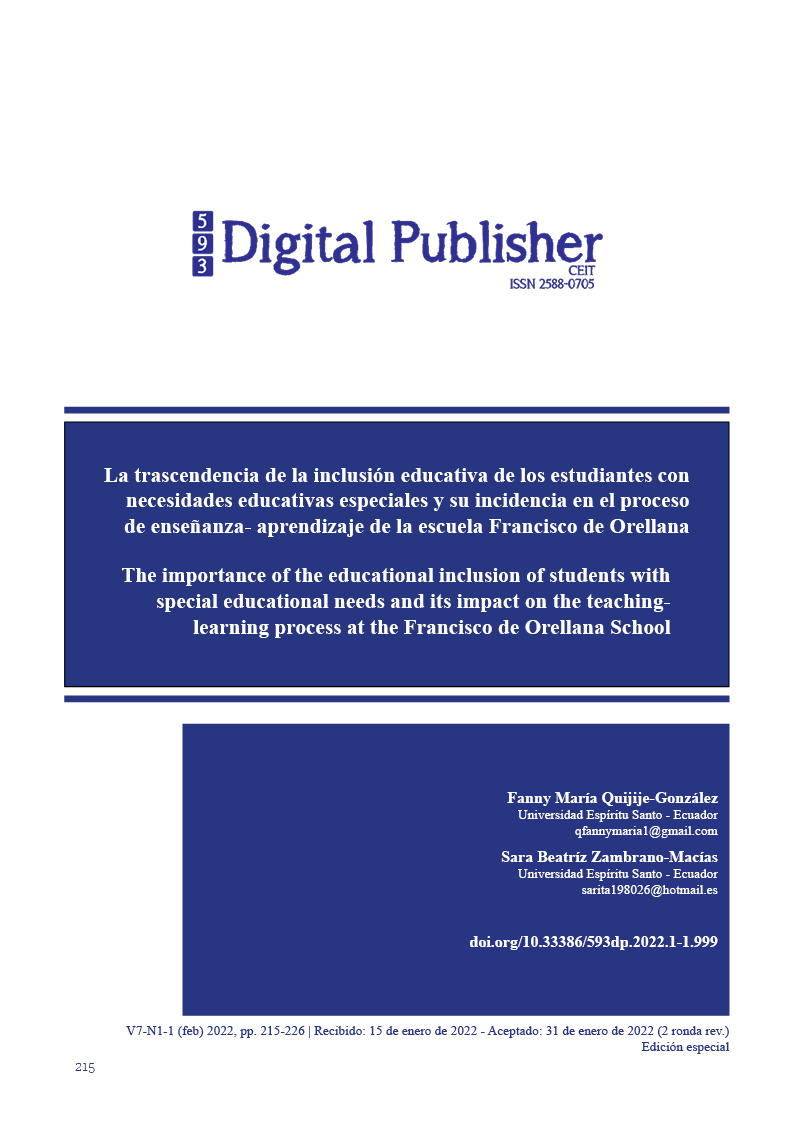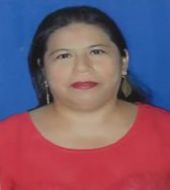The importance of the educational inclusion of students with special educational needs and its impact on the teaching-learning process at the Francisco de Orellana School.
Main Article Content
Abstract
Throughout history, the contemporary world demand educators who are capable of attending to educational inclusion, particularly of children with Special Educational Needs (SEN) in Ecuadorian education.
The article’s purpose is aimed to describe innovative strategies that offer new alternatives in the teaching-learning process in the Educational Inclusion of students. In the practice carried out at the “Francisco de Orellana” school, it was found that the students show learning and inclusion difficulties. They do not have innovative strategies that motivate their learning process. Methods and techniques were used to know the level of learning of the students and their main difficulties. The methods that were used were the logical historical, which studies the facts that have occurred over time in the inclusion; the observation that allow us to collect data in qualitative research study; and the interview which let us discover the institution’s reality. The result was used to innovative strategies that ensure the contribution in the institution, reducing exclusion, involving changes and modifications in the contents, learning strategies with transforming accompaniment to the students. Thus, we will innovate in the society on the way that differences could be appreciated as normal.
Downloads
Article Details

This work is licensed under a Creative Commons Attribution-NonCommercial-ShareAlike 4.0 International License.
1. Derechos de autor
Las obras que se publican en 593 Digital Publisher CEIT están sujetas a los siguientes términos:
1.1. 593 Digital Publisher CEIT, conserva los derechos patrimoniales (copyright) de las obras publicadas, favorece y permite la reutilización de las mismas bajo la licencia Licencia Creative Commons 4.0 de Reconocimiento-NoComercial-CompartirIgual 4.0, por lo cual se pueden copiar, usar, difundir, transmitir y exponer públicamente, siempre que:
1.1.a. Se cite la autoría y fuente original de su publicación (revista, editorial, URL).
1.1.b. No se usen para fines comerciales u onerosos.
1.1.c. Se mencione la existencia y especificaciones de esta licencia de uso.
References
Abreu, Y., Barrera Jiménez, A. D., Worosz, T. B., & Vichot, I. B. (2018). El proceso de enseñanza-aprendizaje de los Estudios Lingüísticos: su impacto en la motivación hacia el estudio de la lengua. Revista MENDIVE, 16(4), 610–623. https://dialnet.unirioja.es/descarga/articulo/6622576.pdf
Albán, J., & Naranjo, T. (2020). Inclusión educativa de estudiantes con discapacidad intelectual: un reto pedagógico para la educación formal. 593 Digital Publisher CEIT, 5(4), 56-68. https://dialnet.unirioja.es/servlet/articulo?codigo=7898156
Alemán, B., Navarro de Armas, O. L., Suárez Díaz, R. M., Izquierdo Barceló, Y., & Encinas Alemán, T. de la C. (2018). La motivación en el contexto del proceso enseñanza-aprendizaje en carreras de las Ciencias Médicas. Revista Médica Electrónica, 40(4), 1257–1270.
American Psychiatric Association. (2014). Manual diagnóstico y Estadístico de los Trastornos Mentales (5a ed.). España: Médica Panamericana.
Booth, T., & Ainscow, M. (2018). Guía para la Educación Inclusiva Desarrollando el aprendizaje y la participación. In Educational Management Administration and Leadership (Vol. 1, Issue 6). http://consultorahumanitas.cl/wp-content/uploads/2019/06/Guia-para-la-Educacion-Inclusiva.pdf
Breijo, T. (2016). ¿Cómo enseñar y cómo aprender para formar competencias profesionales?: un enfoque didáctico desarrollador. Editorial: Universidad de Santander. Universidad de Santander.
Clavijo, R., & Bautista, M. (2020). La educación inclusiva . Análisis y reflexiones en la educación superior ecuatoriana. Alteridad, 15(1), 113–124. http://scielo.senescyt.gob.ec/pdf/alteridad/v15n1/1390-325X-alteridad-15-01-00113.pdf
Cruz, D., Castañeda, D., Serrano, J. (2021). Barreras para la inclusión educativa a estudiantes con discapacidad motora en instituciones educativas públicas. Paideia Surcolombiana, 126-143. https://journalusco.edu.co/index.php/paideia/article/view/2442
Echeita, G. (2017). Educación inclusiva. Sonrisas y lágrimas. Aula Abierta, 46 No0, 17–24. https://dialnet.unirioja.es/servlet/articulo?codigo=6060634
García, M., Aguilar, T. A., & Gutiérrez, V. F. (2019). The challenge of inclusive education: Elements and proposals for improvement | EL RETO DE LA EDUCACIÓN INCLUSIVA: ELEMENTOS IMPLICADOS Y PROPUESTAS DE MEJORA. Prisma Social, 27, 40–64. https://revistaprismasocial.es/article/view/3217
González-Rojas, Y., & Triana-Fierro, D. A. (2018). Actitudes de los docentes frente a la inclusión de estudiantes con necesidades educativas especiales. Educación y educadores, 21(2), 200-218. https://dialnet.unirioja.es/servlet/articulo?codigo=6718922
Guardia, J. J., Del Olmo, J. L., Roa, I., & Berlanga, V. (2019). Innovation in the teaching-learning process: the case of Kahoot! On the Horizon, 27(1), 35–45. https://doi.org/10.1108/OTH-11-2018-0035
López, N. (2016). Inclusión educativa y diversidad cultural en américa latina. Revista Española de Educación Comparada, 27(2016), 35–52. https://doi.org/10.5944/reec.27.2016.15034
Ministerio de Educación. (2011). Educación Inclusiva y Especial. https://educacion.gob.ec/wp-content/uploads/downloads/2013/07/Modulo_Trabajo_EI.pdf
Ministerio de Educación. (2015). Estrategias Pedagógicas Para Atender Necesidades Educativas Especiales. Mineduc, 1–67. https://educacion.gob.ec/wp-content/uploads/downloads/2019/05/Guia-de-estrategias-pedagogicas-para-atender-necesidades-educativas-especiales-en-el-aula.pdf
Parra, C. (2010). Educación inclusiva: Un modelo de educación para todos. Revista_ Isees No, 8, 73–84. https://dialnet.unirioja.es/descarga/articulo/3777544.pdf
Plancarte, P. (2017). Inclusión educativa y cultura inclusiva ( Inclusive education and inclusive culture ). Revista Nacional e Internacional de Educación Inclusiva, 10, 213–226. https://dialnet.unirioja.es/servlet/articulo?codigo=6545223
Ruiz, P. (2016). Percepciones de Docentes y Padres sobre la Educación Inclusiva y las Barreras para su Implementación en Lima, Perú. Revista Latinoamericana de Educación Inclusiva, 10(2), 115–133. https://doi.org/10.4067/s0718-73782016000200008
SaavedraGuajardo, E., Durán, C., Escalera, M., Mora, B., Pacheco, Á. & Pérez, M. (2018). Discapacidad motora y Resiliencia en adultos. En: A. D. Marenco-Escuderos. Estudios del desarrollo humano y socioambiental. (pp. 236-252). Barranquilla, Colombia: Ediciones CUR. https://dialnet.unirioja.es/servlet/articulo?codigo=6676037
Sanz, R., & González, A. (2018). La educación sigue siendo un “tesoro”. Educación y docentes en los informes internacionales de la UNESCO. Revista Iberoamericana de Educación Superior, 9(25), 157–174. https://doi.org/10.22201/iisue.20072872e.2019.25.347
Serrano, E. A. (2017). La Conducción Del Proceso Enseñanza-Aprendizaje. https://www.aacademica.org/alfreserrcas/2.pdf



